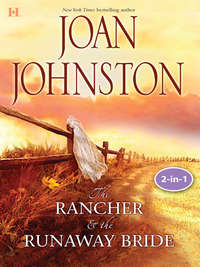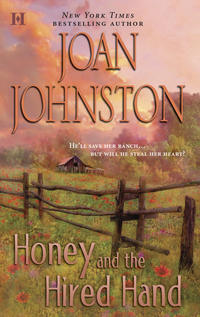
Полная версия
A Little Time In Texas
“Dallas, I—”
It was too late for words. His lips found hers in the dark, and this time he wasn’t gentle. The same mouth that had been so soft was hard with unrestrained need. Ravaging. Plundering. Taking instead of giving.
Behind the need Angel felt his anguish, and she responded to it. Her arms circled him in comfort. Her body softened against his, offering solace. As suddenly as it had begun, the desperation receded, leaving only the need.
He could easily have taken what he wanted from her. She couldn’t have resisted him; he was much bigger, much stronger than she. But as reason returned, his mouth left hers. His arms surrounded her, and he lifted her off the ground as he hid his face in the fall of silky hair at her shoulder.
Angel felt the strain in his body as he fought his grief. He shuddered once, and she felt him swallow hard. She reached up a hand and smoothed his hair back from his brow.
“It’s all right,” she crooned. “It wasn’t your fault. I know you must have done everything you could. Why, you rescued me today without a whisker of thought for your own safety.”
He didn’t answer her, but he didn’t push her away, either. She murmured comforting words, words she knew would not bring back his friend, but which might make him believe his was not such a worthless hide, after all.
For the first time in her life Angel was grateful for the dark. It had allowed this stranger to seek her out; it had allowed her to comfort him. Yet neither had to face the other when he at last lowered her to the ground and stepped away from her.
“Thanks,” he said.
“You’re welcome.”
Dallas took her hand again, and they began to walk. He kept close to the wall to maintain his bearings, until at last the darkness gave way to gray shadows.
“I can see light,” Angel said.
Dallas began to move faster, but Angel wasn’t about to be left behind now. They were almost running when he suddenly stopped.
There it was. The entrance to the cave. The sun was shining. The grass was bright green except where spring wildflowers left splashes of orange and yellow.
Angel’s heart skipped a beat. That was wrong. There shouldn’t be any spring flowers. It was fall. An unusually early frost had already turned the grass brown. But perhaps these were fall flowers; and maybe the frost hadn’t caught this particular glen.
She stayed beside Dallas as they left the cave. Bees buzzed. Birds sang. The mesquite blossomed.
Angel held tightly to Dallas’s hand. “It’s very pretty here.”
“It’s always like this in the spring.”
Angel frowned and looked up at Dallas…and caught her breath when she saw his face in the light. How could he have called those eyes brown? They were hazel, dancing with flecks of green. His hair might have been brown once upon a time, but the sun had streaked it with chestnut and gold. His face wasn’t handsome, nor was it plain. But the wide-set eyes, the cheekbones, the strong jaw were undeniably appealing. And the mouth…
“Don’t look at me like that,” Dallas said. “Not unless you’re willing this time to finish what you start.”
Angel’s gaze left his mouth and met his eyes with their ridiculous curly lashes. “I know this has been a trying few hours. But did you just say that it’s spring?”
“It is,” he said.
“It’s not,” Angel contradicted.
His brow furrowed. He reached out and gently brushed aside the hair that covered her bruised forehead. “Are you all right?”
She brushed his hand away. “When you carried me into the cave it was October.”
“It’s April.”
“October,” she argued.
He shook his head. “No, Angel. I’m afraid not.”
“I don’t understand.”
He thrust a hand through his sun-streaked hair. “Maybe you blocked things out—the shock of being attacked and all,” he suggested.
She shook her head. “I remember everything that’s happened to me since the minute those six cowboys cornered me against that rock.”
“Look, maybe I’d better get you to a doctor.”
“I don’t need a doctor,” Angel insisted. “You do.”
“Yeah, well, maybe—”
Dallas had been urging Angel forward beyond the hills that framed the cave opening. As the terrain leveled, she stopped dead at the sight of something extraordinary in front of her. “What’s that?”
“What?”
She pointed. “That thing. What is it?”
Dallas looked worried. “Look, maybe you bumped your head in there worse than you thought.” He reached out to the small lump on her forehead.
“No. I’m fine,” she insisted. “It’s just a scratch.” She stared at him expectantly, then looked over at the strange black object.
“You really don’t know what that is?”
“No. I really don’t. Do you?”
“It’s my pickup truck.”
“So? What is it?”
Dallas stepped away and looked long and hard at her. “If this is some kind of joke, it isn’t funny.”
“Why would I joke about something like this?” she demanded.
“Where have you been living? This is the twentieth century. Everyone knows—”
She grabbed his arm so tight her nails dug into his flesh. “Did you say the twentieth century?”
“Yes. So?”
Angel swallowed hard. “That isn’t possible.”
“Why not?”
“Because it’s 1864.”
This time it was Dallas’s turn to stare. “It’s 1992.”
Angel shook her head in denial. “You’re wrong. When you dragged me into that cave, it was October 3, 1864,” she insisted.
“When I stepped in from this side, it was April 14, 1992,” Dallas countered.
Angel’s eyes went wide as she backed away from him. “How could that be?”
“I don’t know,” Dallas said. His lips flattened into a thin line. “But if what you’re saying is the truth—” he paused, and it was clear he wasn’t sure whether to believe her or not “—there’s sure as hell no going back the way you came. If you are from the past, it looks to me like you’re trapped here with me—in the future.”
Angel felt the sunlight dimming around her, forming a single tunnel of darkness. It sucked her down, like a whirlpool, and she felt herself surely, inexorably sliding into it.
2
Dallas had faced a loaded gun with calm, but when Angel fainted, he panicked. Somehow, in the time they had spent together in the cave, she had touched some inner part of him that had been held inviolate since his youth. When he saw her collapsing, it was as though something dear to him, something necessary to his very existence, was threatened. Adrenaline flowed, and with superhuman effort he leapt forward and caught her before she hit the ground. Unsure what had caused her to lose consciousness, terrified that she had hurt her head far worse than either of them had suspected, he lifted the slight weight of her limp body into his arms and held her close.
“Angel?”
As he stood staring down at her, he realized that he was in serious danger of stepping over some invisible boundary. He felt the threat. And the temptation.
He fought his inclination to succumb and managed to bring himself back to a more objective state of mind. She was just another victim he had rescued from the forces of evil, nothing more and nothing less. She meant nothing to him. No woman did. No woman ever would.
Still, he couldn’t shake his concern when she didn’t immediately regain consciousness. He quickly carried her to his pickup, and after one-handedly arranging a blanket, he lowered her onto the back seat of the extended cab of the truck. He smoothed the hair off her forehead, exposing a bruise.
When you dragged me into the cave it was 1864.
Either she was the best liar he’d ever met, or she’d hurt herself worse then either of them knew. It was impossible to think she had somehow crossed over a threshold from the past. Wasn’t it?
Right now he had to get her to a doctor as quickly as possible. As he slid behind the wheel and headed the pickup toward San Antonio, he realized he was in something of a dilemma. No doctor was going to believe Angel if she told him she was from the past. Most likely she’d end up committed to some mental institution. And if the doctor did believe her? She’d end up under a microscope in some top-secret government laboratory.
The possibility that Angel had come from the past seemed slight to nonexistent. The only thing in her favor was the quaint language she used. It had been in evidence long before there had been any discussion of where—or when—she had come from.
Unfortunately the cowboys who had surrounded Angel hadn’t looked much different from cowboys today. It was unusual that they’d been on horseback, but not entirely unlikely even in this day and age. Dallas tried to remember distinguishing features about the men who had held Angel at bay. It was hard because once he had caught sight of Angel, he hadn’t been able to drag his eyes off her.
Then he realized that there had been an usual yellow stripe down the outside seam of two of the men’s trousers. Gray trousers. Confederate trousers? His memory must be playing tricks on him. He realized that he wanted to believe her, because he didn’t want to contemplate the fact that she was really hurt or crazy.
It was too bad Angel had lost the rucksack he had seen her set down outside the cave. Maybe there would have been something in it either to prove or disprove her claim. Dallas hadn’t thought to check the pockets of her trousers, but he would have her do that—or do it himself—as soon as he got her home.
Home.
Dallas shoved a hand through his hair in agitation. Where had the idea come from to take her home with him instead of directly to San Antonio? He had no business even considering it. He made the turn to take him west to his ranch on the Frio River outside Uvalde, even as he told himself it was a dumb thing to do.
“Where am I?”
Dallas looked over his shoulder and felt relieved to see Angel sitting up.
“You’re in the back of my pickup—my truck,” he explained when she looked confused.
She winced as her fingertips found the wound on her forehead. “I wasn’t dreaming?”
He shook his head ruefully. “I’m afraid not, Angel.”
Angel’s attention had been focused on the man; now it shifted to her surroundings. Her jaw dropped in amazement. She swallowed hard and said, “We’re moving awfully fast.”
“No more than sixty miles an hour.”
“That isn’t possible! What’s making this…truck…go?”
“Nowadays the horses are under the hood,” Dallas said with a wry smile. He caught a glimpse of Angel’s horrified expression in the mirror. This was no time for an explanation of the internal combustion engine, so he said, “A mechanical contraption inside the front of the truck makes it go.”
Angel waved a hand at all the dials and knobs in front of him. “What do all those buttons do?”
Dallas punched a knob and a country and western tune started playing. “Radio,” he said.
Fascinated, Angel asked, “How does it work?”
“Don’t ask me,” Dallas said, shaking his head. “I don’t understand the innards of most of the modern conveniences I use.”
He punched another button and a blast of cool air hit Angel in the face.
“Air-conditioning,” he explained.
Another button made windshield wipers scrape across the bug-spattered glass; yet another sent water spraying up to clean off the bugs.
“Things have certainly changed a lot,” Angel said, in perhaps the understatement of the century.
“Lady, you don’t know the half of it. Why, we can fly across the entire country in a couple of hours.”
Angel’s cheeks flushed with anger. “Now you’re making fun of me. We both know men can’t fly.”
“Men can’t. Airplanes can.”
“Airplanes?”
“Another mechanical contraption, like a truck with wings, only it moves in the air.”
“I don’t believe you.”
“It’s the truth, whether you believe me or not. Stay around long enough and I’ll show you one. Hell, I’ll even take you up in one!”
“No, thanks,” Angel said vehemently.
“Whether you can accept it or not, there’s been a lot of progress in the past hundred and twenty-five or so years.”
“The clothes you’re wearing are the same,” she protested.
Dallas looked down at the chambray shirt, jeans, and boots he was wearing. “Maybe men’s fashions haven’t changed much. But women show a lot more skin than they used to. Come to think of it, that outfit you’re wearing doesn’t fit my image of what a woman in 1864 ought to have on.
“In Gone with the Wind Scarlett O’Hara was wearing something a little more feminine than that getup, as I recall.”
Angel wondered who Scarlett O’Hara was. She fingered the top button of the striped cotton, round-necked man’s shirt, its sleeves folded up to reveal her slender forearms. A hemp rope held up the too-large, patched wool trousers. On her feet she wore knee-high black boots. “I was traveling dressed as a man, so I wouldn’t be harassed on the road,” she explained.
Dallas glanced at the silvery blond hair that fell practically to her waist and said, “You’re not going to fool too many men with hair like that.”
“My hair was tucked up under a farmer’s hat. I had it off because I’d stopped for a drink of water at that pond near the cave opening. That’s when those piss-poor excuses for cowboys rode up and—” She shrugged. “You know the rest.”
“I guess the question now is, what am I going to do with you?” Dallas murmured to himself.
Angel bristled. “You don’t have to do anything with me. I can take care of myself.”
Dallas drove through a gate and across a cattle guard that led onto his property. “Maybe in 1864 you could have managed by yourself—although even that’s doubtful, considering the situation I found you in. Here in 1992, you’re as naive as a newborn. You wouldn’t last ten seconds on your own.” Dallas pursed his lips in disgust. “I guess I’m stuck with you, all right.”
“Stuck with me! Why of all the cabbage-headed, tom-doodle ideas I ever heard—”
Dallas hit the brakes and the truck fishtailed on gravel as it skidded to a stop. He half turned in the seat and grabbed Angel by the shoulders, drawing her toward him until they were nose to nose.
“Look, you—you nincompoop,” he flung at her, having searched for and found a word as quaint as any of hers. “I’m not any happier about this situation than you are. But let’s get one thing straight. I’m not a cabbage head, a tom-doodle or any of the other names you’ve called me since we had the misfortune to meet. In some convoluted way, I suppose I’m to blame for your predicament.”
“I’ll say!” Angel snapped.
He glared at her and continued, “I’ve never shirked my responsibilities, and I don’t intend to start now. I’ll be by your side every second until I think you’re capable of surviving in this century. Have you got that?”
He shoved her back into the seat, let go and stared at her, daring her to move.
If he’d known Angel better, he wouldn’t have thrown down the gauntlet quite so dramatically. As it was, she was nose to nose with him again in a matter of seconds.
“Now you listen to me,” Angel said, punctuating her speech with a finger poking at his chest. “I’ve been on my own since I was fourteen. And I travel alone—when I please and where I please. Is that clear?”
“As a pane of glass,” he said. “But it doesn’t change a thing. Until I say different, you travel with me, and you go where I say.” He didn’t give her a chance to argue, just turned back to the wheel, started the engine and peeled out so she was slung back against the seat by the force of the truck’s acceleration.
Angel stared at the swiftly passing landscape—bone-dry rolling prairie dotted with mesquite and cactus—and realized she had just missed her best chance to escape from this madman before they arrived at wherever he was taking her. She felt trapped, and she didn’t like it. But Angel had spent her life making the best of bad situations. This was no different. At least that’s what she tried to tell herself.
“Does your insistence on keeping me with you mean that you believe I’m from the past?” Angel asked.
“I don’t know what to believe,” Dallas admitted. “But until I’m sure one way or the other, I don’t intend to take any chances with you.”
“Why should you care what happens to me?”
“I’m a lawman. It’s my duty to help the helpless.”
“You told me yourself you’re on a leave of absence from duty,” Angel countered. “And besides, I’m far from helpless.”
“Then chalk it up to the Code of the West,” Dallas said. “A man protects a woman. That’s just the way things are done—even today. By the way, have you got anything on you that could prove you’re from the past?”
Angel touched her pants pocket protectively. The paper was still there. “No. Nothing.” Nothing I want to show you.
Dallas stopped the truck in front of a peak-roofed two-story white frame house. Several moss-draped live oaks shaded the house, which had a covered porch that ran across the front of it. Victorian gingerbread trim decorated the porch and the eaves. Old-fashioned forest-green shutters flanked the front windows, upstairs and down. It was not a twentieth century house—at least not on the outside.
Dallas stepped out of the truck and helped Angel down. He held on to her hand as he led her up the front porch steps and into the house. He told himself it was because she might need his support. The truth was he felt an unusual sense of possessiveness that made him never want to let her go. He labeled it a delayed reaction to saving her life and tried not to think about it.
Angel stared at the room, which was a mixture of both strange and recognizable objects. “Do you live here alone?”
“I have since my father was shot and killed ten years ago.”
“I’m sorry.” She turned and her blue eyes met his hazel ones, full of sympathy and understanding. “Indians? Or outlaws?”
Dallas stared at her for a moment. That was the sort of instinctual response that could only be made by someone to whom marauding Comanches were still a threat. Someone from the past. “Outlaws,” he said at last. “My father also was a Texas Ranger. He was shot trying to save a child who’d been kidnapped.”
By now Angel had touched almost everything in the room with which she was familiar—the Victorian sofa, the pine trestle table and four chairs, the sideboard, the standing hat rack, the shelves full of leather-bound books and the mantel over the stone fireplace. She had avoided everything else.
Dallas picked up a black object and punched buttons on it. “Hi, Doc,” he said into one end of the object. “I wondered if you could make a house call. I don’t know if you’d call it an emergency. More like a necessary visit. I can’t explain on the phone. Good. I’ll be here.”
“What is that you’re holding?” Angel asked. “Why were you speaking into it?”
“It’s a phone. It’s used to talk to people who are somewhere else.”
Angel frowned. “Magic?”
“No. It’s mechanical. Although I don’t know if you’d call fiber optics exactly mechanical,” Dallas said with a humorous twist of his lips. “Maybe magic is the better word.”
“How does it work?”
Dallas grimaced. Every question she asked pointed out his ignorance of the technical world in which he lived. “I just know how to work it, not how it works,” he admitted. “The world’s not a simple place anymore. There’s a lot we accept on faith. Like, if I turn on the stove I get heat. The refrigerator keeps things cold. I turn a spigot and water comes out, punch a button and the television works. These days people learn specific jobs and don’t know much beyond their own particular skill.”
“Sort of like the butcher and the baker and the blacksmith each has a trade?” Angel asked.
“Exactly the same,” he agreed. “Only things have gotten a lot more complicated since computers were invented.”
Angel didn’t understand a tenth of what Dallas was saying. The words he used meant nothing, provoked no images of anything with which she was familiar. It was hard not to feel overwhelmed. And frightened. Much as she hated to admit it, perhaps staying with Dallas wasn’t such a bad idea—at least until she could absorb and understand some of the shocking changes the world had undergone. Or until she could figure out some way to get back to her life in the past.
“Would you like to see the rest of the house?” Dallas asked.
“I suppose.”
Dallas showed Angel the kitchen, demonstrating modern appliances that kept her eyebrows perpetually raised in astonishment. The bathroom had a sink, toilet and tub, all of which she longed to use. There were three bedrooms. The two bedrooms upstairs were filled with furniture he called antiques, but which she found achingly familiar. The downstairs bedroom had been converted into an office. Besides what Dallas described as “a bed hidden in the sofa,” the room contained more mechanical devices, including a mystical “computer” that had apparently revolutionized the way things were done in the modern world.
“Would it be all right if I take a bath?” Angel asked, looking longingly in the direction of the large indoor tub she had seen.
Dallas frowned. “I’d feel better if Doc Philips checked you out before I leave you alone behind a closed door.”
“How long before he gets here?”
A knock on the door answered her question. “I suspect that’s him now.”
Dallas opened the door to a handsome young man, not much older than he, wearing a white Oxford cloth shirt and jeans with a denim jacket. His eyes were a startling blue and openly curious when he spotted Angel.
Dallas put a protective arm around Angel’s shoulders and pulled her forward. “Angel, this is Dr. Adam Philips. We grew up as neighbors. Adam, this is Angel Taylor.”
“You both look pretty healthy to me,” Adam said. “Why the urgent call?”
Dallas’s gaze slid to Angel and back to the doctor. “Everything isn’t always what it seems.”
“Meaning?”
“Angel has a bump on her head. I’d like you to check it out.”
Dallas met Adam’s questioning gaze but shook his head slightly to indicate he didn’t want to talk.
“All right,” Adam said. “Let’s get to it. How about if you lie down on the couch, Angel, and I’ll look you over.”
Angel eyed the doctor’s black bag anxiously. She had never had much use for doctors. She tensed as he pulled a small object out of the bag. He pushed a button and the contraption in his hand lit up. She sat up abruptly. “What’s that?”
Adam looked at her and then at Dallas before he answered. “A sort of flashlight, so I can see into your eyes.”
“What’s a flashlight?” Angel demanded suspiciously.
Dallas saw in Adam’s expression the concern about Angel that he had been feeling himself for the past several hours. He listened as Adam calmly explained the inner mechanism of a flashlight, down to how a battery worked, and found himself chagrined to be learning along with Angel. All the time Adam talked, the doctor slowly but thoroughly examined his patient.
Angel was relieved when the doctor took an ordinary stethoscope from his bag, but became concerned again when he withdrew what he said was a blood-pressure cuff. He was straightforward in his explanations of everything he did before he did it, answering her questions as though they weren’t at all unusual. Though his instruments frightened her, nothing he did in his examination hurt her. He cleaned her skinned knee using something from a unique spraying can, then covered it with gauze and tape.
When Adam had finished with his medical examination, he stood up and walked over to talk privately with Dallas. “The skinned knee is superficial. As far as I can tell, the bump on her head is just that—a bump. There’s no sign of concussion. Or anything else I can find to explain why she doesn’t seem to recognize some very ordinary objects when they’re presented to her. That is why you called me, isn’t it? There’s something wrong with her memory. Some kind of selective amnesia?”
“Not exactly,” Dallas hedged.
“If that’s all you’re going to say, I can’t be any more help to you.” Adam headed for the door, medical bag in hand.







